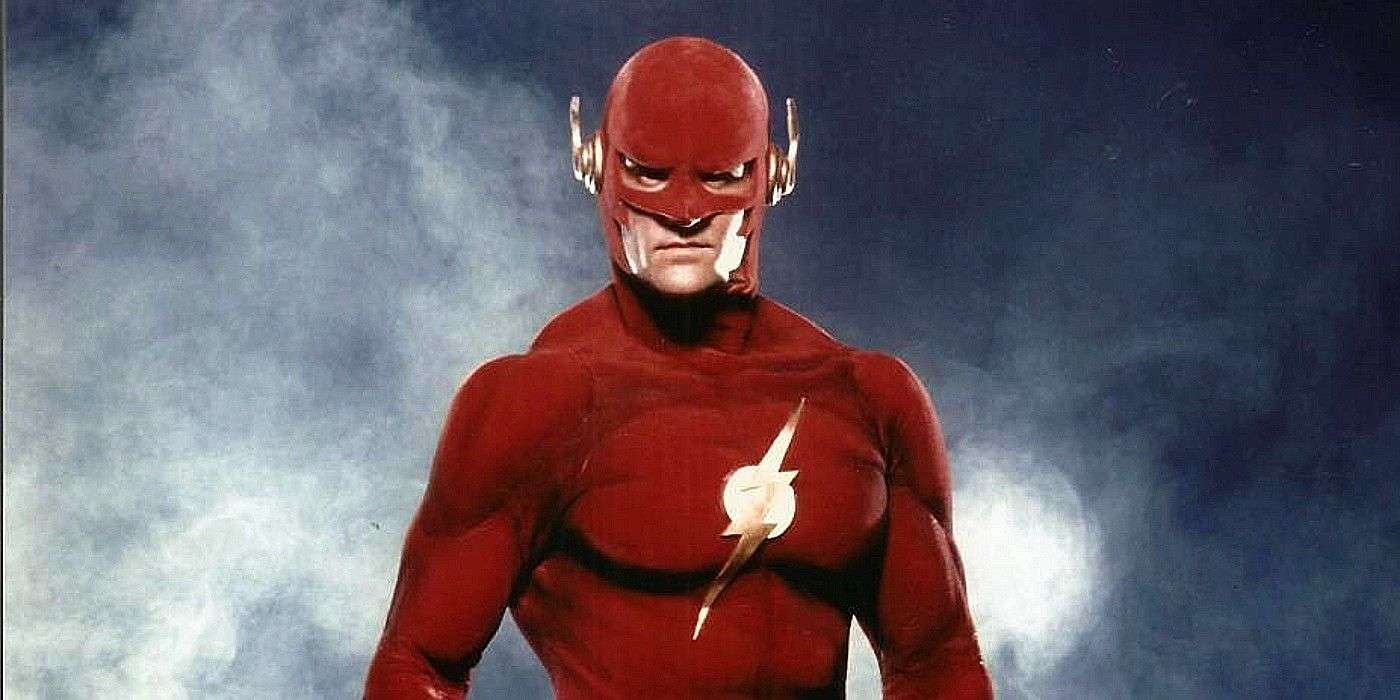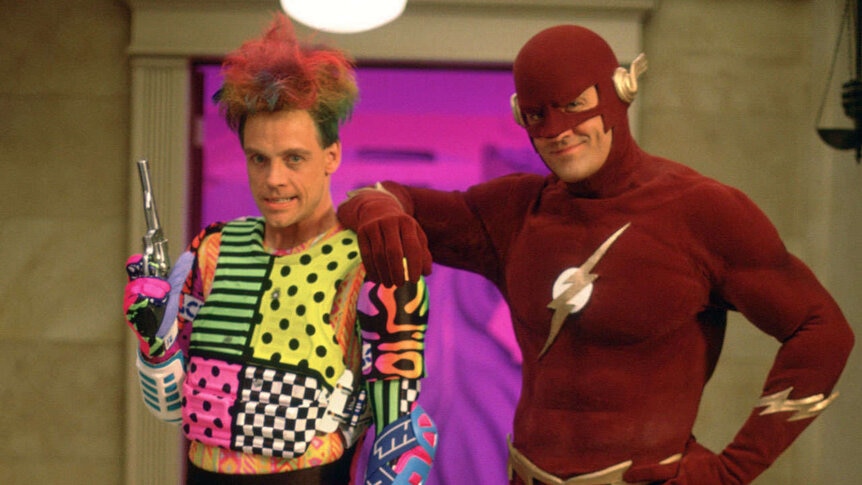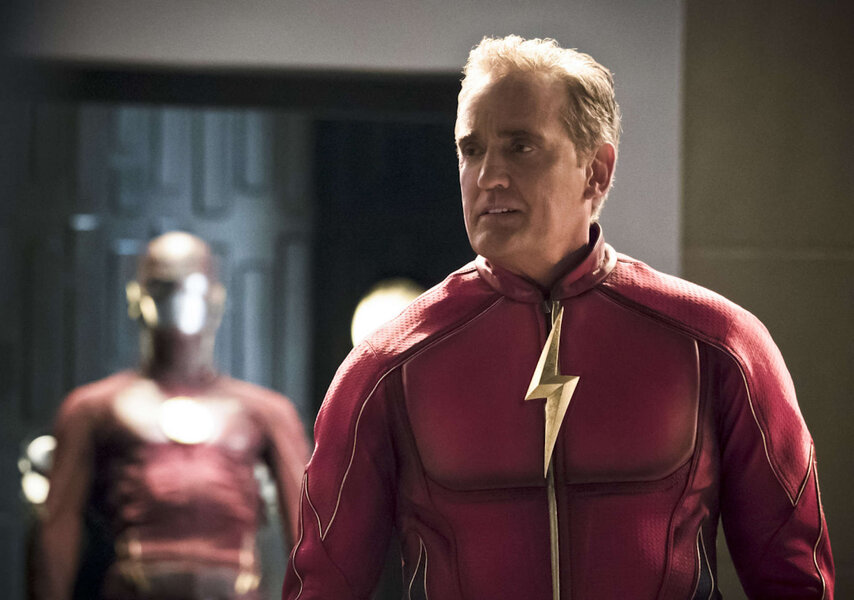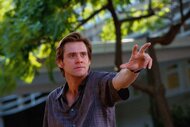Create a free profile to get unlimited access to exclusive videos, sweepstakes, and more!
The Flash star John Wesley Shipp walked in the '90s so superhero TV could run today

Initially, two-time Daytime Emmy winner John Wesley Shipp had doubts about auditioning for the '90s TV adaptation of The Flash. In fact, he’s embarrassed to say he’d never heard of the DC Comics character, created in 1956 by Robert Kanigher and Carmine Infantino. If anything, Shipp confused him with Flash Gordon.
“Immediately, I thought of the 1960s Batman, which I watched as a kid. I was like, 'I had done theater and had pretensions of being a serious actor. I’m not sure I want to spoof a comic book character for television. That’s not really one of my aspirations, so I’m skeptical,’” Shipp recalls. But, Emmy-winning casting director April Webster encouraged him to just read the pilot script, written by series creators Danny Bilson and the late Paul De Meo.
Upon reading the script, Shipp was impressed. For starters, it was not campy like the 1960s Batman series. In fact, it was dark, like Tim Burton’s 1989 Batman. Legendary composer Danny Elfman even wrote the theme to both Batman and The Flash. Furthermore, The Flash TV show had been created due to Batman '89's success, demonstrating to the CBS brass a more mature take on comic book superheroes could work, according to Bilson.
“I realized we have [Barry Allen], an unblessed son in a cop family where real cops work the streets,” Shipp tells SYFY WIRE, remembering what it was about the pilot that sold him on this more serious version of the Scarlet Speedster. “When I get to the part where [Barry] gets the power... His first reaction was not pure Hollywood hero; it was ‘I want to get rid of it — I don’t want to know from this. I don’t want to be a hero on any level.’”
That changes when Barry’s brother Jay (Tim Thomerson, Trancers) is murdered. Barry vows to avenge his death and becomes a symbol of hope as the Flash.
The Flash debuted on Sept. 20, 1990, on CBS. The pilot episode drew 15-18 million viewers and received reviews in the mainstream media, including The Washington Post — something unusual for a superhero show at that time. Each episode cost $1.5 million, then the largest budget for a TV show. Four Flash costumes were made, costing $100,000 each, according to Shipp.
“They weren’t putting me in red tights with LED lights on my running shoes,” Shipp says, laughing. “I never wanted to say dialogue in the suit because I was always afraid of becoming a mascot.”
The Flash was up and running (no pun intended) after the successful pilot. In fact, it ran for 22 episodes. Among Shipp’s favorite episodes are “Twin Streaks,” where he played Pollux, an evil clone of himself in a blue Flash costume, and “The Trickster,” guest-starring Star Wars’ Mark Hamill. (Hamill would go on to play the Trickster again in two episodes of The CW's The Flash in 2015.)
“Certainly, Mark Hamill revolutionized my way of thinking about being in the suit,” Shipp says. “Because if I was self-conscious about it before Mark hit the backlot as the Trickster, I was like, ‘OK, Shipp, get over yourself because Mark — no holds barred, balls to the wall — is here as the Trickster. If Mark can rock the unitard like that, I can get over my bad self.’ That’s been a friendship that’s continued. I’m very grateful for Mark and his family.”
Hamill’s Trickster was hardly the toughest foe The Flash went up against. The series was up against some stiff competition, originally airing on Thursdays at 8 p.m. against The Cosby Show and The Simpsons in a highly-publicized ratings battle. CBS moved The Flash to 8:30 p.m., an unusual time-slot for an hour-long show, and launched a promotional campaign to tune in “After Bill, After Bart.” This move didn’t work and The Flash subsequently changed time-slots twice more. To make things even worse, The Flash was preempted numerous times, which further hurt the show’s audience as ratings dropped.
“We would’ve definitely had a second season if there was DVR back then,” Shipp says. “I started hearing from our core audience — ‘We can’t find you.’”
Age might have been another member of The Flash’s Rogues Gallery. CBS had the oldest demographics at that time, according to series writer Howard Chaykin. The network’s big hits were Murder, She Wrote, Designing Women, Knots Landing, and Dallas, shows that skewed well over The Flash’s target audience.
“There was, to be clear, no appropriate place to promote the show to a nonexistent CBS audience that might show up,” Chaykin says.
“The ratings weren't strong enough,” adds Bilson. “We were lucky to get a back nine, meaning the episodes beyond the first 13. We were saddened when it was canceled. There was a lot of support for the show at CBS among the group that developed it, but the numbers weren't strong enough to convince senior management even though we were one of the few shows with younger demographics.”
When The Flash was canceled (the final episode aired on May 18, 1991), it was good and bad news for Shipp. While he was disappointed there would be no Season 2, he was relieved because the show was the hardest thing he had ever done. They worked long hours and often at night from the third week in August 1990 until the second week of May 1991. Plus, the costume was uncomfortable.
“I would be under the shower at 6 o’clock — ‘God, is it 6 a.m. or 6 p.m.?’” Shipp remembers. “I [longed] for those red tights because it was so hot. Everything was glued to my face. I was sweating buckets and losing weight. They would take my glove off and you could hear the suction as it came off my wrist... I couldn’t sit down, so they brought out a lean-board. For the series, they came up with a vest they use for race car drivers with tubing in it and they plugged me into an ice chest between takes to circulate ice water through the vest, so it would snap me awake because I would lose my concentration if I got that hot.”
Had there been a second season, Bilson says, the first episode would’ve had the Trickster, Mirror Master (David Cassidy, The Partridge Family), and Captain Cold (Michael Champion, Pink Cadillac) join forces. Plans were underway to introduce Weather Wizard.
“Paul and I were very proud of the show and how it’s still appreciated now, years later,” Bilson says.
“It’s interesting that 30 years later, I’m still talking about the experience of The Flash,” Shipp says. “For whatever reason, these characters and these stories — my version and the new version — are so meaningful to people that they very often get emotional talking about it. The fact that something I did at the end of one season 30 years ago… still makes me enthusiastic about talking about it. It’s very moving to me.”
This wasn’t the end of Shipp’s association with the Flash. He voiced Professor Zoom on the animated series Batman: The Brave and the Bold. On the current Flash (starring Grant Gustin), which will begin its seventh season in 2021, Shipp has played Henry Allen, Jay Garrick (another Flash), and reprised his role as Barry nearly 30 years later. He’s grateful executive producers Greg Berlanti, Andrew Kreisberg, and Geoff Johns invited him to be part of their show.
“I remember (director) David Nutter called all the cast together. It was an emotional moment for me. He said, ‘If it weren’t for this man right here, proving that these stories could be told on television, none of us would be here today.’ Everyone burst into applause and my eyes filled with tears,” he Shipp.
“This is the coolest thing we’ve ever done!” declared Gustin when Shipp appeared in his Flash costume, which demonstrates just how much Shipp is indelibly linked to the Scarlet Speedster despite the hardships he endured making the one-season wonder in the ‘90s.
“Do I mind?” Shipp says. “I’ve been to Peru, Ecuador, Santiago, Dublin, Paris, London, all over the United States in front of thousands of the most affirming and enthusiastic people who on some level were touched by a role I find myself in at a particular point in my life. It’s electrifying, really. So, no — I have no regrets.”
















